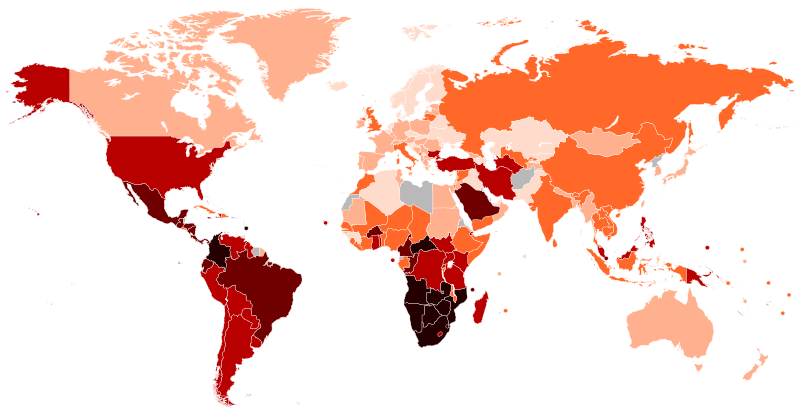Your wiki link for inequality has China ranked 98, not 71, putting it much closer to the USA at 107.
I'm not sure if you understand how a ranked list works: you can invert the ranking order and the relative difference is identical. Whether you say China is 98 and USA 107 (a difference of 9) or you say China is 71 and the USA is 62 (a difference of 9), the relative difference is the same (it's 9). The only difference is how you interpret which is better, which I didn't do. My point was they're similar and middling in the ranking.
Also notably, the Gini index has a very long list of nominally “capitalist” countries ahead of China, which meet your criteria for a sustained fight against inequality and taking care of the poor.
This is irrelevant to the point I was making. My point wasn't that China is uniquely positioned with low income inequality. My point was twofold: it is middling in its rankings (i.e., not the most unequal), and it's decreasing. The fact that it's steadily decreasing is directly related to the point I made about the CPC truly working for the people to solve the real problems they're facing: they identified a problem, identified some causal factors, discussed the importance of fixing it, made plans of how to fix it, are implementing those plans, and make reports on the progress of those plans. You'll also notice that those capitalist countries which have less income inequality than China have more government intervention in the market (i.e., tempering the "free market") in part because the issue doesn't address itself in a capitalist system, and intervention has to be taken to address the problem. This is what China is doing, too: their income inequality problem isn't magically going away on its own free will, it is going away because of government intervention in the economy.
Forgive me as you’ve written quite a bit here but this seems to be the only concrete policy to discuss vis-a-vis capitalist vs communist systems. The rest is subjective language about “working for the people”. Every politician gets up on stage and talks about how they’re fighting hard to give people better lives. No one really gives those statements any credit.
The difference is that Western politicians rely on selling a promise and not delivering. Yes, they get up on stage and talk, and then do nothing. With the CPC, they actually show results. They make plans and publish them, they implement them, and they publish update reports that show whether or not they stuck to what they said they would do. This is not another situation with empty promises; if it was, they either wouldn't publish update reports or the update reports would show that they aren't doing what they said they would. You're confusing form and function: both CPC and Western politicians make promises, but the Western politicians do not deliver and the CPC does. There's a reason CPC support in China is so high, and it's because the party truly works for and benefits the people; if it were empty promises that never benefited the people, they wouldn't have so much support for the party.
(Edit: I was wrong in the direction I had sorted when I wrote this comment initially. I have removed the now irrelevant part. My point still stands: the two countries I compared are similar, and China is middling in it's ranking; inverting the sort order doesn't make the countries less similar, and since they're middling, inverting the sort order means they're still middling. I didn't make a claim that one was better than the other).

It seems you're right. I will edit that part of my comment. But I will point out: I wasn't making a statement that one was worse than the other. I made the point that they're similar in ranking and like I said, even if you reverse ranking order they're still just as similar. And, since they were middling in their ranking like I originally said, if you invert the sorting, they're still middling.